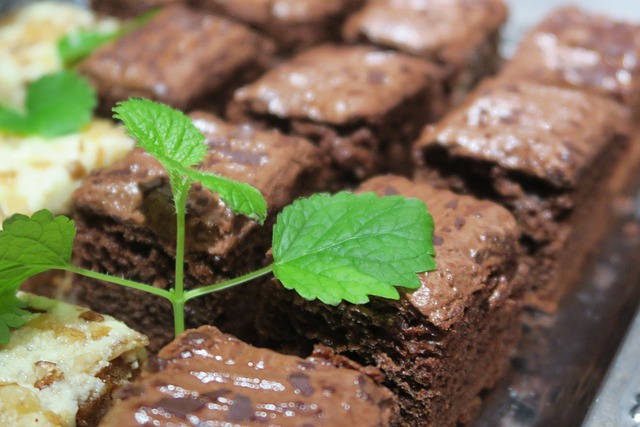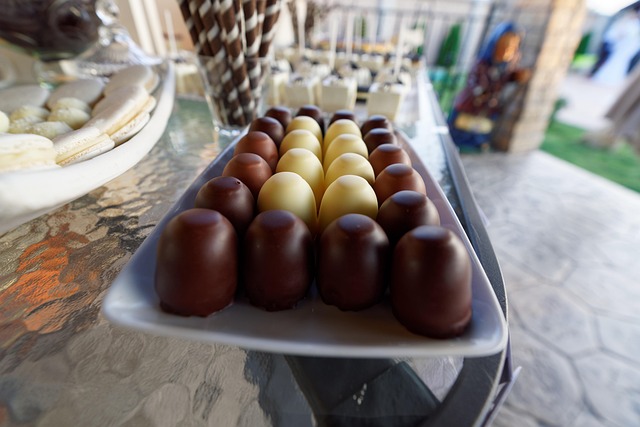Baking perfect 70th Birthday Cookies involves a delicate balance of science and art, where proteins, fats, and carbohydrates create diverse textures and flavors. Mastering ingredients like flour, fat, sugar, and eggs ensures ideal cookies. Consistent oven temperature, precise baking times, and careful techniques are key to success. Personalized designs transform these cookies into memorable keepsakes for 70th birthday celebrations, combining delicious treats with unique storytelling.
Dive into the fascinating science behind baking cookies, where chemistry meets creativity. From understanding the fluffiness of dough to mastering the perfect crumble, this article explores the intricate balance of ingredients and techniques that transform simple mixtures into delectable treats. Learn how flour, fat, sugar, and eggs interact to create textures that tantalize taste buds. Discover the art of crafting custom 70th Birthday Cookies, combining scientific precision with personal touch for a truly memorable celebration.
- Understanding the Chemistry Behind Baking: The Science of Fluffs and Crumbles
- The Role of Ingredients: From Flour to Fat, Unlocking Flavor and Texture
- Mastering the Baking Process: Temperature, Time, and Techniques for Perfection
- Creating Memorable Treats: Designing Custom 70th Birthday Cookies
Understanding the Chemistry Behind Baking: The Science of Fluffs and Crumbles

Baking cookies is a delicate balance of science and art, where understanding the chemistry behind each ingredient transforms a simple recipe into a delightful treat. When crafting 70th Birthday Cookies, for instance, bakers must consider how proteins, fats, and carbohydrates interact to create the perfect texture—a delicate fluff or a satisfying crumble. Proteins, primarily found in flour, form gluten, which acts as a web-like structure that traps air bubbles created by leavening agents like baking soda or powder. This trapping action contributes to the cookies’ rise and their characteristic soft, chewy texture.
Fats, such as butter or oil, play a crucial role in enhancing flavor and creating layers of flaky textures. They also slow down the gluten’s development, allowing for a more spread-out shape and preventing overly tough cookies. Carbohydrates, present in sugars and starches, influence browning and texture through Maillard reactions—a complex chemical process that gives baked goods their appealing golden crusts and distinctive flavors. Balancing these elements is key to achieving the perfect cookie: whether it’s a fluffy, bite-sized delight or a more substantial, crumbly treat for special occasions like a 70th Birthday celebration.
The Role of Ingredients: From Flour to Fat, Unlocking Flavor and Texture

The science behind baking cookies begins with understanding the role of each ingredient. Flour, for instance, acts as the foundation, providing structure and texture to the dough. The type of flour used—whether all-purpose, cake, or whole wheat—impacts the final cookie’s consistency and flavor profile. Fat, such as butter or margarine, is another critical component. It adds moisture, richness, and helps leavening agents distribute air throughout the dough, resulting in light and fluffy 70th Birthday Cookies. The fat also contributes to the cookies’ tender crumb and crisp edges.
Additionally, sugar plays a pivotal role in enhancing flavor and browning. Different sugars, like granulated, brown, or powdered, offer unique tastes and textures. Eggs serve as natural binders, providing structure and contributing to the cookies’ color and rise. They also act as emulsifiers, helping fat and water combine seamlessly. These ingredients collectively unlock the perfect balance of flavor and texture, ensuring every bite of your 70th Birthday Cookies is a delightful experience.
Mastering the Baking Process: Temperature, Time, and Techniques for Perfection

Mastering the baking process is key to creating delectable 70th Birthday Cookies that are perfectly crisp on the outside and soft on the inside. Temperature plays a vital role; a consistent and precise oven temperature ensures even cooking, preventing under- or over-baking. Typically, cookies bake between 280°F (138°C) to 350°F (176°C), depending on their size and your desired doneness. The baking time is equally crucial; it usually ranges from 8 to 12 minutes, but keeps a close eye on them as they can go from perfect to burnt in just a minute.
Techniques like stirring the dough gently, using room-temperature ingredients, and chilling the dough before shaping can significantly impact texture and spread. Overmixing can lead to tough cookies, so mix until just combined. Chilling the dough allows for better control over shape and prevents spreading, resulting in elegant 70th Birthday Cookies that turn heads at any celebration.
Creating Memorable Treats: Designing Custom 70th Birthday Cookies

Creating unique and memorable treats is an art, especially for special occasions like a 70th birthday celebration. Custom 70th birthday cookies are a delightful way to mark this significant milestone. Bakers can transform simple cookie dough into stunning works of edible art by incorporating personalized designs and themes. Each cookie becomes a miniature masterpiece, telling a story of the celebrant’s life and interests.
For instance, intricate icing patterns can depict hobbies or achievements, while clever slogans and messages add humor and warmth. These cookies not only satisfy a sweet tooth but also serve as cherished keepsakes, allowing guests to take home a piece of the celebration. The science of baking comes alive when creating these treats, ensuring the perfect balance of texture, flavor, and design to make the 70th birthday cookies an unforgettable experience.
